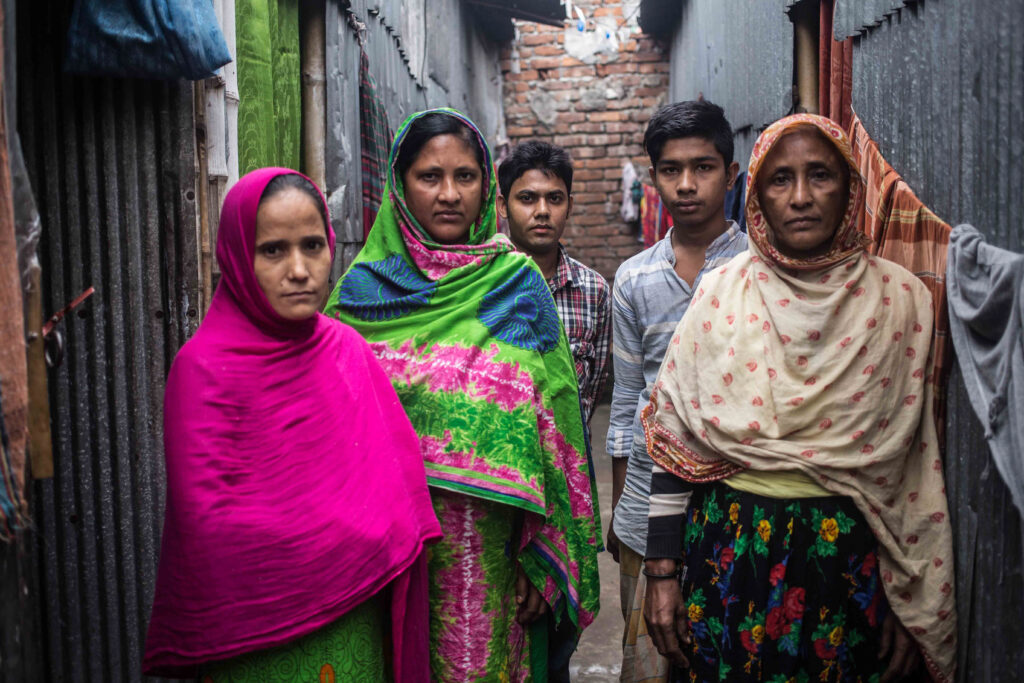GWD PUBLIC CHANNEL
The weekly surveys from the GWD Public Channel include “core” (or repeat) questions related to basic topics such as work hours, wages, food security and digital payments in addition to “special” (or one-time) questions submitted by stakeholders that can be about any topic. The following are examples illustrating how different stakeholders have used the GWD Public Channel in Bangladesh.
CASE STUDY 1. WAGES AND WORK HOURS.
Objective: a stakeholder interested in information related to wages and work hours to inform an upcoming minimum wage revision.
Solution: analysis of data already collected on this topic and design and implementation of special questions (one-time) surveys meant to address specific issues on this topic in a more in-depth manner and that are more qualitative in nature.
CASE STUDY 2. FACTORY RESPONSE TO COVID-19
Objective: At the height of the pandemic when workers first returned to work a stakeholder, unable to do surveys inside of factories due to the pandemic, was interested in assessing which measures to prevent the spread of COVID-19 were put in place by factories and whether workers considered them adequate and made them feel safe at work.
Solution: The stakeholder submitted a set of special questions related to specific measures such as mask wearing, rotating hours and social distancing at work in addition to questions related to workers’ perception on the effectiveness of these measures. This survey was implemented 3 times between May 2020 and March 2021 and gender disaggregated data was shared with the stakeholder within 3 weeks of data collection.
CASE STUDY 3: WORKERS’ PRIORITIES AND CONCERNS
Objective: A stakeholder was interested in incorporating worker voice representation and data into their direction and decision making, with a focus on workers’ experiences within the workplace to better understand and prioritize areas for improvement.
Solution: Submitted questions related to contracts and workers’ priorities regardubg workplace issues on different topics. The results were used to inform their sustainability and responsible business goals and priorities for 2022.
GWD private channels
The sample, survey and scope of GWD Private Channels are customized to the needs of the stakeholder. Below are a few examples of how stakeholders have used private channels to address specific concerns within their supply chain.
CASE STUDY 1. IMPACT OF TRAINING PROGRAM
Objective: Assess the impact of a skills and training program on the ability of workers to better handle the economic impact of the COVID19 pandemic.
Solution: Establish a communication channel with workers from different factories that took part in the program and ask questions related to their financial situation. Use data from GWD public channel as benchmark.
Result: Workers that took part in the program were more resilient. They reported higher wages and better work hours, a higher debt capacity, lower food insecurity and higher rates of joint decision making within their households. Crucially, they also started receiving digital wages before the pandemic.
CASE STUDY 2. WORKER VOICE PROGRAM ON WORKPLACE DYNAMICS
Objective: Stakeholder was interested in including worker voice into their decision making on a number of topics related to workplace satisfaction and engagement as well as financial security.
Solution: Establish a channel of communication with workers in selected factories. The survey was designed to collect quantitative and qualitative data on all their topics of interest using a mix of core (weekly) and one-time questions.
Result: Design of interventions to address issues identified, monitoring of impact of intervention (through a project extension) and improvement of survey questions based on study findings.
UNIQUENESS
GWD is a great complement to but different from other worker voice initiatives, for three main reasons:
Outside of Factory. We collect data outside of the factory setting, at a time and place where workers feel safe and at ease.
Trust. Regular (weekly) communication with workers not only helps build a picture over time of their lives and work conditions but, crucially it is key to building trust with the workers. GWD is a safe space where workers feel comfortable sharing details about their lives without fear of retaliation such as getting fired or being labelled as “difficult”.
Independent. We do not have an agenda other than to ensure a wide range of stakeholders have access to the channel to gain insights into workers’ context, experience, and opinions so these can be included in decision-making processes that affect their lives.
